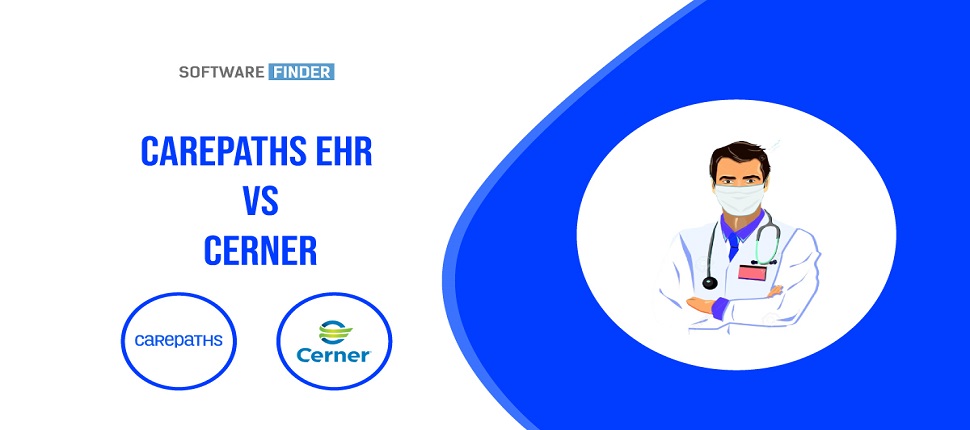CarePaths EHR and Cerner EMR software are two popular electronic health record (EHR) systems used in the healthcare industry
CarePaths EHR
It is a web-based electronic health record system designed for mental health and behavioral health practices. It offers a range of features specific to the needs of these specialties, including:
- Comprehensive patient records: CarePaths EHR allows clinicians to maintain and access detailed patient records. It include demographic information, clinical notes, treatment plans, medication history, and progress notes.
- Billing and coding: The software facilitates billing and coding processes. Including support for insurance claims, electronic billing, and integration with billing systems.
- Scheduling and appointments: CarePaths EMR includes scheduling functionality that enables users to manage appointments, send reminders, and track availability of providers.
- Medication management: The system provides tools for managing medication lists, prescribing medications, and monitoring medication interactions.
- Specialty focus: CarePaths EMR is designed specifically for mental health and behavioral health practices. It offers specialized features and workflows tailored to these specialties. Such as outcome measurement tools, treatment plan templates, and documentation forms specific to mental health diagnoses.
- Telehealth capabilities: CarePaths EMR may provide integrated telehealth functionality, allowing clinicians to conduct virtual appointments. Securely communicate with patients, and share documents electronically.
- Practice management: In addition to clinical features, CarePaths EHR may offer practice management tools to support administrative tasks. Such as appointment scheduling, insurance verification, and revenue management.
- User interface: The user interface of CarePaths EHR is designed to be intuitive and user-friendly, allowing clinicians. And staff to navigate and document patient information efficiently.
- Reporting and analytics: CarePaths EMR offers reporting capabilities to track practice metrics, generate outcome reports, and comply with regulatory requirements.
Cerner EMR:
Cerner EMR (Electronic Medical Record) is an integrated EHR system widely used in hospitals and healthcare organizations. It provides a comprehensive set of features and functionalities, including:
- Patient records: Cerner EMR allows healthcare providers to maintain complete electronic records of patients. It has medical history, lab results, diagnostic images, medication lists, and treatment plans.
- Clinical decision support: The software includes clinical decision support tools that provide alerts, reminders. And evidence-based guidelines to help clinicians make informed decisions.
- Interoperability: Cerner EMR supports interoperability standards, allowing for the exchange of patient data between different healthcare systems and providers.
- Order management: The system enables electronic ordering of tests, medications, and procedures, with integration into the workflow of healthcare providers.
- Revenue cycle management: Cerner EMR software includes billing and coding functionalities to support accurate documentation and streamline the revenue cycle process.
- Scalability: Cerner EHR is commonly used in large healthcare organizations and hospitals. Indicating its scalability to handle a high volume of patient records and complex healthcare environments.
- Interoperability: Cerner EMR focuses on interoperability. It allowing for the seamless exchange of patient data across different healthcare systems, departments, and facilities.
- Clinical decision support: Cerner EMR includes robust clinical decision support features. Such as integrated clinical guidelines, alerts for drug interactions or allergies, and reminders for preventive care measures.
- Integration and ecosystem: Cerner has developed an extensive ecosystem of healthcare solutions. And services that can integrate with the EMR system, offering additional functionalities and options for customization.
Conclusion
It’s important to note that both CarePaths EMR and Cerner EHR are robust systems with numerous features and capabilities. Customization options may vary depending on the version, modules, and configurations chosen by each healthcare organization. When selecting an EHR system, it’s crucial to evaluate your specific requirements. Consider factors like scalability, integration capabilities, user interface, training and support options. And ensure that the chosen system aligns with your organization’s needs and goals.
It’s important to note that both CarePaths EHR and Cerner EMR software are highly regarded systems in their respective domains. The choice between them depends on the specific needs of your healthcare organization. The size and type of practice, the specialties you focus on, and other factors unique to your workflow and requirements. Evaluating demos, consulting with vendors, and seeking input from other healthcare professionals can help inform your decision-making process.





